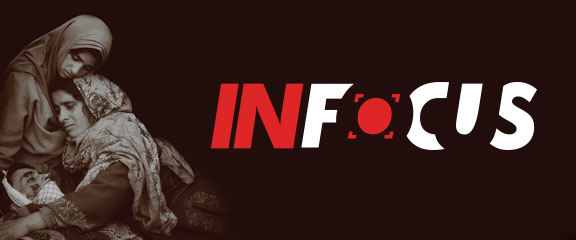The deliberate attempt to undermine and under-representing Muslim majority Kashmir region shows the Delimitation Commission’s utter disregard to law and their own constitutional provisions
Sidelining all the social, ethical and legal basis of redrawing the electoral maps, the controversial and politically motivated Delimitation Commission for Indian Administered Jammu and Kashmir formed by Hindu-dominated right wing Bharatiya Janata Party (BJP) recommended six additional seats for the minority Jammu region (now total 43) against only one additional seat for the majority Kashmir region (now total 47). The controversial move caused huge uproar and resentment from people living on both sides of the Line of Control (LoC), particularly in Indian-held territory of Jammu and Kashmir where leadership across the political spectrum denounced the disenfranchisement and disempowerment of Kashmiri Muslims and termed it as a deliberate attempt to change the region’s demography, tilt power balance in the favour of Hindu-dominated Jammu region and further exclude Muslim majority Kashmir region from political representation.
The constitution of such a commission for redrawing political boundaries to favour a particular community is a brazen violation of the United Nations Security Council (UNSC) resolutions on Kashmir. The UNSC resolutions on Kashmir clearly bar concerned parties from taking any decisions aimed at bringing material change in the state.

The commission’s recommendations are blatantly unjustified and illogical as the population, which happens to be the cardinal parameter in such processes has been grossly overlooked and ignored while creating new constituencies.
A fair delimitation, based on population, should have given 51 seats to Kashmir and 39 to Jammu. Notwithstanding the fundamental principles, the commission on the contrary has recommended six additional seats to Jammu and just one for Kashmir region, which is bigger in size in terms of population.
Secondly, the panel’s proposed draft suggests higher population size in 47 constituencies located in Kashmir (with an average population size of 1.46 lakh) as compared to 43 constituencies in Jammu (with 1.25 lakh). Disparity in the population size clearly reflects the commission’s mala-fide intentions to bring Jammu at par with Kashmir in terms of seats in the state legislature. Therefore, the commission’s recommendations are clearly politically motivated aimed at changing the demographic character and composition of the state.
According to the 2011 census, Muslim population comprises of around 68 per cent followed by population of Hindu, which is around 28.4 per cent. Muslims the largest population (religion wise) accounts to 8.5 million, followed by around 3.5 million Hindus. Majority of the Muslim population is based in Kashmir region which is around 97 per cent making it a Muslim-dominated region.
Surprisingly, the commission announced nine additional seats for Scheduled Tribes. Of these, three will be in Kashmir (Gurez, Kangan, Kokernag) and six in Jammu (Gulabgarh, Rajouri, Budhal, Surankote, Mendhar, Thannamandi) which again is an attempt to benefit one region by downplaying the majority.
The broad daylight gerrymandering and political engineering in Kashmir by the BJP started soon after the racial regime led by Modi abrogated article 370 and 35-A of the Indian Constitution that had guaranteed special status to J&K. Such erroneous assessment of the ground situation with a clear intent to marginalize Muslim majority is also a part of ruling BJP’s nefarious agenda to crush the Kashmiris’ ongoing struggle for right to self-determination.
Given the nature of the disputed state of Jammu and Kashmir, such a commission has no legal standing. The whole exercise is a part of a larger conspiracy intended to marginalize and isolate the majority community in the region where dissent is a crime and people have no freedom to speak
BJP’s political agenda in the disputed state of Jammu and Kashmir is to build around the politics of disempowerment, and dismemberment through marginalisation of Kashmiri Muslims, muzzling dissent, promoting hate, division and perpetrating worse human rights crises. The delimitation commission is an extension of this strategy feared and forecasted by people of Kashmir after illegal abrogation of statehood.
Delimitation commission doesn’t stand on merit on various accounts; there are a number of grave discrepancies in its report for instance geographical realities, which along with population are prerequisite for drawing of electoral constituencies have been grossly ignored.
Thirdly, the commission has gone out of the way in dealing with the issue despite the fact the 84th amendment to the Constitution of India in 2002 declared that delimitation will be carried out after 2026; It clearly shows that the current commission has violated constitutional provisions and, therefore, its observations whatsoever stand illegal.
Besides, India’s Delimitation Act 2002 guarantees that no delegates are “overrepresented” or “underrepresented” and preserve “population seat ratio” and the commission recommendations on Jammu and Kashmir is clear violation of the provision by giving “over representation” to Hindu dominated Jammu region which is roughly 28 percent of total population.
The deliberate attempt to undermine and under-representing Muslim majority Kashmir region shows the Delimitation Commission’s utter disregard to law and their own constitutional provisions.

On the other hand, the article 330 of the Constitution of India which deals with allocation of seats for Scheduled Castes, states that the allocation for the tribes should correspond to the total population of state but the current delimitation commission undermined this parameter and allocated seats for scheduled Tribe (ST) and schedule castes just to extrapolate numerical balance in favor of Hindu dominated Jammu region. According to the Indian census 2011, tribal population is less than 11 per cent of the total population of the Indian Administered State of Jammu and Kashmir.
Practically, the commission through its contentious observations has greatly augmented the BJP’s plan to further polarize the less privileged and economically downtrodden minorities of the state by allocating six seats for Jammu and three seats for ST&SC from Kashmir region-a perfect recipe to polarize and pitch and pit two tribal communities and regions against each other.
Escalation of this divide between two tribes Gujjars and the Paharis was amplified by BJP during the last elections by granting 4 percent reservations for Paharis resulting in disdain towards one another. Now the new redrawing of maps and allocation of seats has further widened the fault lines — be it linguistic, ethnic or tribal — in communities who have been living peacefully together for ages.
Ironically all the seven seats have been reserved for Scheduled Castes in Jammu region again excluding Muslim majority in Kashmir region. First the BJP wooed Gujjar tribe as ST and later in elections exploited Paharis for the same purpose.
One can connect this entire exercise with the BJP’s old wish to install Hindu chief minister in the disputed state to undermine the Kashmir region, which is the epicenter of legitimate resistance against Indian occupation. One can call it De-Muslimisation Commission as it not only disempowered Muslims of valley by adding only one out of total seven seats, but also slashed three seats of Muslim majority areas in Jammu where total six seats were added to Hindu majority regions. The discrepancies in the commission’s report are obvious and so blatant that leadership across the political spectrum rejected it out rightly.
Moreover, the decision to merge Poonch and Rajouri districts (with sizeable Hindu population) with Anantnag parliament constituency in south Kashmir with almost 500km land distance between the two as per se has no logic except to thrust Hindu voters into Muslim-dominated constituency to change voting dynamics in favor of former to achieve political objectives of the BJP — a party which thrives and excels on exclusive religiously motivated population of Hinduism.
A close look at Kishtwar and Poonch district further exposes BJP’s dangerous agenda of communal rift. With a total population of 2.3 lakh – 40 per cent Hindus and 57 per cent Muslims, with already two Muslim majority seats, the new arrangement allotted three seats to the district — two of them carved out as Hindu-majority seats. On the other hand, Poonch with population twice the size of Kishtwar has only three seats since it is a Muslim majority district. Likewise, Doda district with four lakh population, more than 53 per cent Muslims, had both Muslim majority seats and with new arrangements two out of three seats are Hindu majority constituencies. A clear message to all Muslim of Indian administered Jammu and Kashmir that BJP will forcibly and illegally change their demography from democratic majority to minority.
Given the nature of the disputed state of Jammu and Kashmir, such a commission has no legal standing. The whole exercise is a part of a larger conspiracy intended to marginalize and isolate the majority community in the region where dissent is a crime and people have no freedom to speak. With the fear of public resentment, Indian authorities have locked up thousands of Kashmiris including their leadership, and carried out a massive crackdown on media, and civil society.
This delimitation commission too is the continuation of previous attempt of changing Kashmiri majority into minority by issuing over 3.4 million so-called domicile certificates to outsiders (non-state-subjects) who were made eligible for citizenship rights after modifying the state’s domicile law following the repeal of article 370 and 35-A of the Indian Constitution in 2019.
Such malicious attempts, which are a part of the racial regime’s long-term plan to turn Kashmiri Muslims into a political minority, are bound to further polarize an already divided region and lead to chaos if the international community and United Nations do not pay heed to such unlawful, brazen and egregious gerrymandering of the BJP government.



